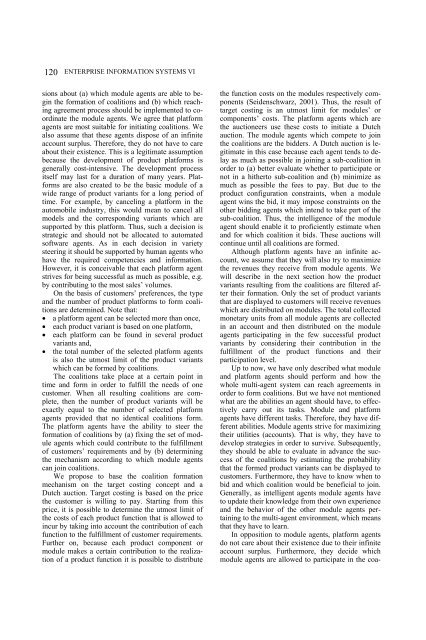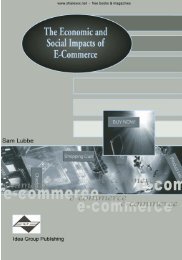Back Room Front Room 2
Back Room Front Room 2
Back Room Front Room 2
You also want an ePaper? Increase the reach of your titles
YUMPU automatically turns print PDFs into web optimized ePapers that Google loves.
120 ENTERPRISE INFORMATION SYSTEMS VI<br />
sions about (a) which module agents are able to begin<br />
the formation of coalitions and (b) which reaching<br />
agreement process should be implemented to coordinate<br />
the module agents. We agree that platform<br />
agents are most suitable for initiating coalitions. We<br />
also assume that these agents dispose of an infinite<br />
account surplus. Therefore, they do not have to care<br />
about their existence. This is a legitimate assumption<br />
because the development of product platforms is<br />
generally cost-intensive. The development process<br />
itself may last for a duration of many years. Platforms<br />
are also created to be the basic module of a<br />
wide range of product variants for a long period of<br />
time. For example, by canceling a platform in the<br />
automobile industry, this would mean to cancel all<br />
models and the corresponding variants which are<br />
supported by this platform. Thus, such a decision is<br />
strategic and should not be allocated to automated<br />
software agents. As in each decision in variety<br />
steering it should be supported by human agents who<br />
have the required competencies and information.<br />
However, it is conceivable that each platform agent<br />
strives for being successful as much as possible, e.g.<br />
by contributing to the most sales’ volumes.<br />
On the basis of customers’ preferences, the type<br />
and the number of product platforms to form coalitions<br />
are determined. Note that:<br />
�� a platform agent can be selected more than once,<br />
�� each product variant is based on one platform,<br />
�� each platform can be found in several product<br />
variants and,<br />
�� the total number of the selected platform agents<br />
is also the utmost limit of the product variants<br />
which can be formed by coalitions.<br />
The coalitions take place at a certain point in<br />
time and form in order to fulfill the needs of one<br />
customer. When all resulting coalitions are complete,<br />
then the number of product variants will be<br />
exactly equal to the number of selected platform<br />
agents provided that no identical coalitions form.<br />
The platform agents have the ability to steer the<br />
formation of coalitions by (a) fixing the set of module<br />
agents which could contribute to the fulfillment<br />
of customers’ requirements and by (b) determining<br />
the mechanism according to which module agents<br />
can join coalitions.<br />
We propose to base the coalition formation<br />
mechanism on the target costing concept and a<br />
Dutch auction. Target costing is based on the price<br />
the customer is willing to pay. Starting from this<br />
price, it is possible to determine the utmost limit of<br />
the costs of each product function that is allowed to<br />
incur by taking into account the contribution of each<br />
function to the fulfillment of customer requirements.<br />
Further on, because each product component or<br />
module makes a certain contribution to the realization<br />
of a product function it is possible to distribute<br />
the function costs on the modules respectively components<br />
(Seidenschwarz, 2001). Thus, the result of<br />
target costing is an utmost limit for modules’ or<br />
components’ costs. The platform agents which are<br />
the auctioneers use these costs to initiate a Dutch<br />
auction. The module agents which compete to join<br />
the coalitions are the bidders. A Dutch auction is legitimate<br />
in this case because each agent tends to delay<br />
as much as possible in joining a sub-coalition in<br />
order to (a) better evaluate whether to participate or<br />
not in a hitherto sub-coalition and (b) minimize as<br />
much as possible the fees to pay. But due to the<br />
product configuration constraints, when a module<br />
agent wins the bid, it may impose constraints on the<br />
other bidding agents which intend to take part of the<br />
sub-coalition. Thus, the intelligence of the module<br />
agent should enable it to proficiently estimate when<br />
and for which coalition it bids. These auctions will<br />
continue until all coalitions are formed.<br />
Although platform agents have an infinite account,<br />
we assume that they will also try to maximize<br />
the revenues they receive from module agents. We<br />
will describe in the next section how the product<br />
variants resulting from the coalitions are filtered after<br />
their formation. Only the set of product variants<br />
that are displayed to customers will receive revenues<br />
which are distributed on modules. The total collected<br />
monetary units from all module agents are collected<br />
in an account and then distributed on the module<br />
agents participating in the few successful product<br />
variants by considering their contribution in the<br />
fulfillment of the product functions and their<br />
participation level.<br />
Up to now, we have only described what module<br />
and platform agents should perform and how the<br />
whole multi-agent system can reach agreements in<br />
order to form coalitions. But we have not mentioned<br />
what are the abilities an agent should have, to effectively<br />
carry out its tasks. Module and platform<br />
agents have different tasks. Therefore, they have different<br />
abilities. Module agents strive for maximizing<br />
their utilities (accounts). That is why, they have to<br />
develop strategies in order to survive. Subsequently,<br />
they should be able to evaluate in advance the success<br />
of the coalitions by estimating the probability<br />
that the formed product variants can be displayed to<br />
customers. Furthermore, they have to know when to<br />
bid and which coalition would be beneficial to join.<br />
Generally, as intelligent agents module agents have<br />
to update their knowledge from their own experience<br />
and the behavior of the other module agents pertaining<br />
to the multi-agent environment, which means<br />
that they have to learn.<br />
In opposition to module agents, platform agents<br />
do not care about their existence due to their infinite<br />
account surplus. Furthermore, they decide which<br />
module agents are allowed to participate in the coa-









